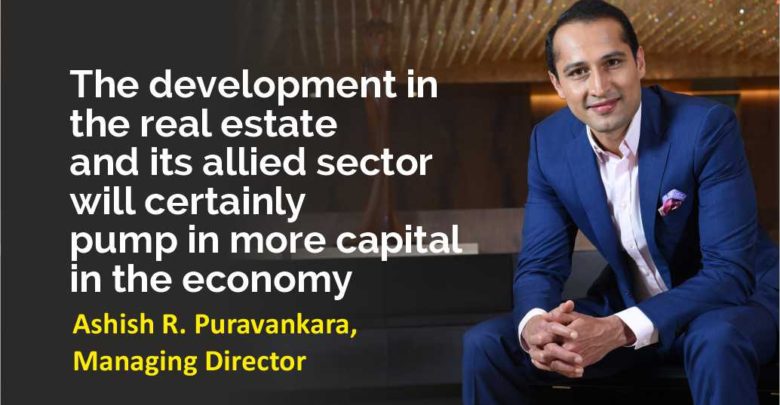The development in the real estate and its allied sector will certainly pump in more capital in the economy
Ashish R. Puravankara, Managing Director

What are the major projects that you are currently working on? Please share some details.
The pandemic has certainly altered many business plans across industries. At Puravankara, we were quick to adopt new ways in business operations and that helped us stay on track with our residential launch pipelines across both our brands Puravankara and Provident Housing. For FY 21, we are launching 11 projects, out of which four have already been launched. These 11 projects include six under the Puravankara luxury brand and five under the Provident affordable housing brand. The new launches will also mark our re-entrance in the Mumbai Metropolitan Region.
Recently we partnered with IFC, a member of the World Bank Group, and IFC Emerging Asia Fund (EAF) and both the organisations will be investing US$76 million towards the development of four residential projects under our Provident brand. Two of these four projects are planned in Kochi and Bengaluru with a saleable area of 4.5 million sf/ft. About 4,000 housing units will be built in the next five to seven years, with other projects to be identified by 2021.
On the commercial real estate front we have planned investments of Rs. 7,000 cr over the next 7 years to build assets across 12 msft. Delivering office, retail and mixed-use property will only reinforce our position as a reputable developer of diversified projects, while also adding value to our residential mix. We have identified the cities of Bengaluru, Hyderabad, Mumbai and Pune for commercial real estate, and the excellent location of our assets within these markets, combined with the credibility of our development partners and our technical expertise in design and innovation will only support our expected take-up rates, going forward.
Also, we are focusing on expanding our product offerings in commercial/industrial asset classes to cater to increased long-term needs for quality office space, logistics hubs and other industrial facilities. For realising our aspirations in this business, we are leveraging on the expertise and network of international players via strategic partnerships, e.g., our JV with Morgan Stanley to develop warehouses in south India.
How do you view the government plans, policies and financial initiatives in the field of EPC and infrastructure?
The Government of India has made three announcements of the stimulus measures undertaken to aid the recovery of the economy. In October, the Honourable Finance Minister Nirmala Sitharaman announced an increase in its capital expenditure outlay for FY 20-21 by Rs 25,000 crore. This is in addition to the Rs 4.12 lakh crore already announced in the Union Budget for Infrastructure.
The funding push for infrastructural projects will not just enable world-class infrastructure in the country but will also result in massive job opportunities in the sector. Better infrastructure adds value to real estate. Enhanced connectivity helps home-buyers in exploring options that are both serene and yet easily accessible from the heart of the towns.
The Government’s push to connect mass transit projects through the expansion of roads and opening of new modes of commute such as sea planes etc. will open up avenues for additional investment and higher revenue generation from these regions. The Government’s push for Electric Vehicles and EV infrastructure will strengthen our tenacity and nurture a cleaner world for the next generation. Such public investments that are generators of employment opportunities and can be implemented efficiently are of the essence.
Tell us about your opinion on the upcoming mega-projects in our country that has the potential to drive our economic growth.
There are some major infrastructure projects in our country that are noteworthy and are sure to benefit the public and drive growth. The Government of India has been proactive in its efforts to constantly improve the infrastructure of the country to bolster the economy and also encourage foreign investors. Through its well-developed framework of Public-Private Partnerships (PPP), The Government is targeting an expansion of the national highway network by over 200,000 km. The Bharatmala Pariyojana, aims to build 66,100 km of economic corridors, border and coastal roads, and expressways to boost the highway network with the aim to increase vehicular speeds by 20-25%, thereby eventually bringing down the supply chain costs by 5%-6% as per the plans of the Government.
The Government has allocated $1.4 Trillion for the infrastructural development of the country until 2025 and has several projects in its kitty that will result in favourable economic outcomes in the regions they have been sanctioned. A few projects that have already revolutionised the country are Metro stations in all major cities of India. It has not only eased the connectivity to different parts of the cities but has also decongested a lot of routes in the process. Having found success in these transport systems, the Government is looking at newer and faster projects that can facilitate quicker transportation. While the Bullet Train project has already been given a nod and is ongoing, the initial tests to see the possibility of Hyperloop travel in Maharashtra through a PPP with Virgin Hyperloop is underway.
The Government has also laid and launched several projects such as bridges and tunnels that improve the connectivity or shorten the distances between two places. Other significant projects such as the Bogibeel Bridge in Assam, which is the largest earthquake-resistant road and Railway Bridge spanning over 4.94 kms. The recently launched Atal Tunnel is another example of India being pioneers of world-class innovation in terms of infrastructure.
What do you think about the luxury real estate projects in India? Do you feel that we are levelling up with world-class luxury projects?
The ongoing pandemic has created an increased need for stability and security in all aspects of our lives and has highlighted the importance of owning a home. People today, are keen on investing in living spaces that complement their aspirations and add convenience to their day to day lifestyle. We have observed a shift in the perception of luxury – from chandeliers and fancy home décor to a holistic living experience.
Today’s home buyer is a personality of evolved taste- one who’s well-travelled and exposed to international realty services. So the customer looks beyond the regular amenities which add to their social demeanour in terms of sustainable and stylish living. They focus on integrated developments that have all the available amenities at one location, thereby reducing their dependence on external facilities such as gyms, playgrounds, parks etc. The pandemic has also changed the way we live, work and rest. With health and safety being the utmost priority, the buying patterns have evolved. Projects with spacious homes and more green spaces, smart technology that aids the new lifestyle are preferred.
At Puravankara, through our WorldHome Collection, we are offering the future of smart and sustainable living through home automation in projects that have all luxury conveniences and amenities, including expansive green spaces, air filtration systems etc…, along with all the regular facilities and amenities of a gated community, including swimming pools, club-houses and multipurpose halls.
Lastly, is there any message you would like to give to your audience at large, in terms of achievements in one’s field and contributing to our country’s growth?
The real estate sector has been evolving from brick and mortar to a service driven product offering. The pandemic will further result in ever-evolving customer requirements that will enable the growth of the sector. Additionally, favourable macroeconomic policies and technological transformations will allow it to flourish in the coming years. According to the Indian Brand Equity Foundation, the real estate sector in India is expected to reach a market size of US$ 1 trillion by 2030 and contribute 13 per cent of the country’s GDP by 2025.
In a post COVID world, the housing sector is going to play a key role in India. The development in the real estate and its allied sector will certainly pump in more capital in the economy which will create more jobs opportunities. This will further create a conducive investment environment, which will open up more viable business avenues and it will eventually boost the entire economy.


